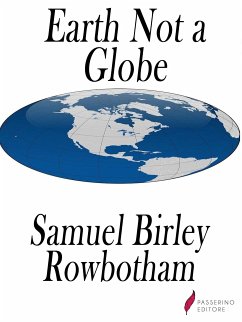Zetetic Astronomy: The Earth Not a Globe or simply Earth Not a Globe is a pamplet written in 1881 by Samuel Rowbotham, under the pseudonym "Parallax". It is the basis for most the flat earth theories supported by the Flat Earth Society.
Samuel Birley Rowbotham (AKA Parallax) (1816 – 1884), was an English medical doctor and inventor who wrote Zetetic Astronomy: Earth Not a Globe, based on his decades-long scientific studies of the earth.
The flat Earth model is an archaic conception of Earth's shape as a plane or disk. Many ancient cultures subscribed to a flat Earth cosmography, including Greece until the classical period, the Bronze Age and Iron Age civilizations of the Near East until the Hellenistic period, India until the Gupta period (early centuries AD), and China until the 17th century.
The idea of a spherical Earth appeared in Greek philosophy with Pythagoras (6th century BC), although most pre-Socratics (6th–5th century BC) retained the flat Earth model. In the early fourth century BC Plato wrote about a spherical Earth, and by about 330 BC his former student Aristotle provided evidence for the spherical shape of the Earth on empirical grounds. Knowledge of the spherical Earth gradually began to spread beyond the Hellenistic world from then on.
Despite the scientific fact of Earth's sphericity, pseudoscientific flat Earth conspiracy theories are espoused by modern flat Earth societies and, increasingly, by unaffiliated individuals using social media.
Samuel Birley Rowbotham (AKA Parallax) (1816 – 1884), was an English medical doctor and inventor who wrote Zetetic Astronomy: Earth Not a Globe, based on his decades-long scientific studies of the earth.
The flat Earth model is an archaic conception of Earth's shape as a plane or disk. Many ancient cultures subscribed to a flat Earth cosmography, including Greece until the classical period, the Bronze Age and Iron Age civilizations of the Near East until the Hellenistic period, India until the Gupta period (early centuries AD), and China until the 17th century.
The idea of a spherical Earth appeared in Greek philosophy with Pythagoras (6th century BC), although most pre-Socratics (6th–5th century BC) retained the flat Earth model. In the early fourth century BC Plato wrote about a spherical Earth, and by about 330 BC his former student Aristotle provided evidence for the spherical shape of the Earth on empirical grounds. Knowledge of the spherical Earth gradually began to spread beyond the Hellenistic world from then on.
Despite the scientific fact of Earth's sphericity, pseudoscientific flat Earth conspiracy theories are espoused by modern flat Earth societies and, increasingly, by unaffiliated individuals using social media.









